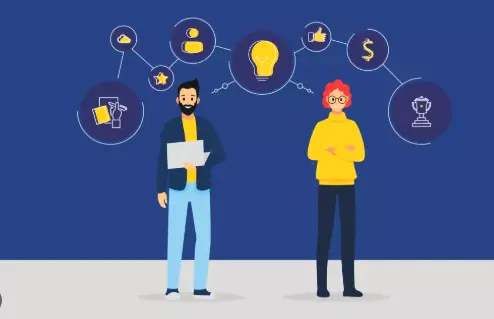As a public speaker, understanding the difference between intrinsic and extrinsic motivation can significantly impact how you approach your speeches and connect with your audience. While intrinsic motivation comes from within, driven by personal satisfaction and passion, extrinsic motivation is fueled by external rewards such as recognition or accolades. Both types of motivation can influence your performance, but recognizing when and how to tap into each can help you deliver more engaging, authentic, and effective presentations.
In this article, we’ll explore the key differences between intrinsic and extrinsic motivation and how they affect your journey as a speaker.
Extrinsic vs. Intrinsic Motivation in Public Speaking

Public speaking is an essential skill that plays a significant role in various aspects of life, from professional settings to personal development. Whether delivering a speech at a conference, presenting a project at work, or addressing a community, motivation is a crucial factor that drives individuals to take the stage. Motivation in public speaking can be classified into two main types: extrinsic and intrinsic. Understanding the differences between these two forms of motivation can help speakers harness their strengths and become more effective communicators.
Extrinsic Motivation in Public Speaking

Extrinsic motivation refers to external factors that drive a person to engage in public speaking. These external rewards or pressures can include financial incentives, recognition, career advancement, or social approval. In public speaking, extrinsic motivation manifests in various ways, such as:
1. Professional Advancement
Many individuals engage in public speaking to enhance their careers. Business leaders, politicians, and professionals often deliver speeches to establish their authority, build their brand, and gain credibility. In such cases, the motivation to speak comes from the desire to achieve professional goals rather than an inherent passion for speaking itself.
2. Financial Rewards
For some speakers, financial incentives play a crucial role in their motivation. Professional speakers, trainers, and coaches often receive payment for their speeches, workshops, or seminars. The prospect of earning money can drive individuals to refine their public speaking skills and participate in speaking engagements.
3. Recognition and Prestige
Recognition from peers, the public, or the media is another extrinsic motivator. Winning awards, receiving praise, or gaining followers can encourage speakers to improve their skills and continue speaking. Social validation and admiration can be powerful incentives, pushing individuals to perfect their delivery and content.
4. Obligation or External Pressure
Some individuals engage in public speaking due to external pressures rather than personal desire. A student may be required to present a project in class, an employee might need to deliver a report, or a leader may have to address their team. In these cases, the motivation to speak comes from fulfilling a duty rather than a deep-seated interest in the act of speaking itself.
While extrinsic motivation can be effective in driving people to speak publicly, it may not always lead to long-term satisfaction. If the rewards or pressures disappear, so might the desire to continue public speaking.
To summarize:
| Extrinsic Motivation | Description |
| Professional Advancement | Speaking to enhance career opportunities, build credibility, and establish authority. |
| Financial Rewards | Receiving payment for speeches, workshops, or training sessions. |
| Recognition and Prestige | Gaining social approval, awards, and admiration from an audience or peers. |
| Obligation or External Pressure | Being required to speak for work, school, or other commitments. |
Intrinsic Motivation in Public Speaking

Intrinsic motivation, on the other hand, comes from within. It is the internal desire to speak publicly because of personal satisfaction, enjoyment, or a sense of purpose. Individuals driven by intrinsic motivation engage in public speaking because they find it fulfilling, meaningful, or intellectually stimulating. Some key examples include:
1. Passion for Sharing Knowledge
Many speakers are motivated by a deep passion for a subject and a desire to educate or inspire others. Teachers, researchers, and thought leaders often find joy in conveying their knowledge to an audience, regardless of external rewards.
2. Personal Growth and Self-Improvement
For some, public speaking is a means of personal development. They enjoy the challenge of refining their communication skills, overcoming stage fright, and expressing their ideas clearly. The satisfaction of seeing personal growth fuels their motivation to continue speaking.
3. The Joy of Connecting with an Audience
Some speakers find immense fulfillment in engaging with an audience. The ability to evoke emotions, inspire action, or make a difference in people’s lives can be a strong intrinsic motivator. This sense of connection and impact can be more rewarding than external incentives.
4. A Sense of Purpose or Mission
Certain speakers are driven by a strong sense of purpose. Activists, social leaders, and motivational speakers often speak because they believe in a cause or want to create change. Their motivation is deeply rooted in their values and the impact they hope to achieve.
Unlike extrinsic motivation, intrinsic motivation tends to be more sustainable. Individuals who genuinely enjoy public speaking or find personal meaning in it are more likely to continue improving and engaging in it, regardless of external circumstances.
In a nutshell:
| Intrinsic Motivation | Description |
| Passion for Sharing Knowledge | Enjoying the process of educating and inspiring others. |
| Personal Growth and Self-Improvement | Using public speaking as a tool for developing confidence and communication skills. |
| The Joy of Connecting with an Audience | Finding fulfillment in engaging, influencing, and inspiring listeners. |
| A Sense of Purpose or Mission | Speaking to support a cause, advocate for change, or make a meaningful impact. |
Finding the Right Balance
While intrinsic motivation is generally more sustainable and fulfilling, extrinsic motivation is not inherently bad. In fact, many effective public speakers are driven by a combination of both. The key is to strike a balance between the two:
- Leverage extrinsic motivation to push yourself forward – If career advancement or recognition motivates you to start public speaking, use that as a stepping stone to build confidence and experience. However, do not rely on external validation to manage your improvisations. Embrace your unique qualities and quirks that make you, you! Be authentic through this process.
- Develop intrinsic motivation over time – As you gain more experience, focus on finding personal meaning in public speaking. Discover the joy of sharing ideas, connecting with audiences, and growing as a communicator.
- Stay adaptable – Motivation can shift over time. Someone who starts speaking for financial reasons may later develop a deep passion for inspiring others. Being open to this evolution can lead to a more fulfilling public speaking journey.
Conclusion
Intrinsic motivation is what elevates public speaking from a mere skill to a lifelong asset.
At MicFront, we go beyond teaching the mechanics of speaking – we inspire individuals to discover their unique voice, connect with their message, and ignite the FIRE (Fun, Integrity, Results, Empathy) in every audience they engage with.
Public speaking requires motivation, and understanding the difference between extrinsic and intrinsic motivation can help individuals develop a deeper appreciation for their speaking journey. While extrinsic motivators such as financial rewards, recognition, and career growth can drive people to speak, intrinsic motivators such as passion, self-improvement, and a sense of purpose create lasting fulfillment. By balancing both forms of motivation, speakers can not only enhance their skills but also find genuine enjoyment and meaning in public speaking.
At MicFront, we believe that the most impactful speakers know how to harness both intrinsic and extrinsic motivation to inspire and engage their audiences. Whether you’re driven by a passion for storytelling, personal growth, or the desire to advance your career, our expert-led training programs will help you develop confidence, refine your message, and command the stage with authenticity.
Join MicFront today and take the first step toward becoming a powerful, purpose-driven speaker!